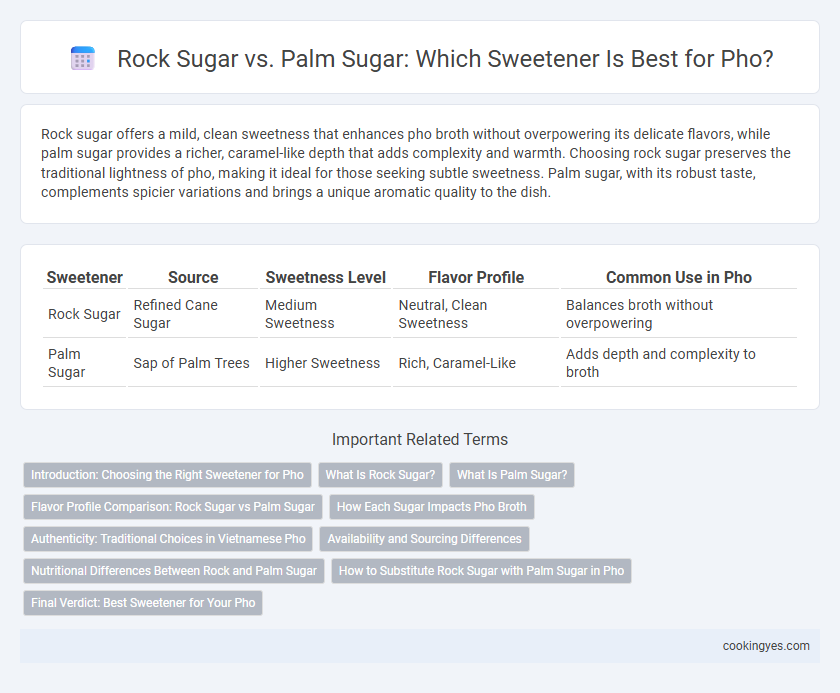Rock sugar offers a mild, clean sweetness that enhances pho broth without overpowering its delicate flavors, while palm sugar provides a richer, caramel-like depth that adds complexity and warmth. Choosing rock sugar preserves the traditional lightness of pho, making it ideal for those seeking subtle sweetness. Palm sugar, with its robust taste, complements spicier variations and brings a unique aromatic quality to the dish.
Table of Comparison
| Sweetener | Source | Sweetness Level | Flavor Profile | Common Use in Pho |
|---|---|---|---|---|
| Rock Sugar | Refined Cane Sugar | Medium Sweetness | Neutral, Clean Sweetness | Balances broth without overpowering |
| Palm Sugar | Sap of Palm Trees | Higher Sweetness | Rich, Caramel-Like | Adds depth and complexity to broth |
Introduction: Choosing the Right Sweetener for Pho
Rock sugar and palm sugar both serve as popular sweeteners in pho, each imparting distinct flavors and sweetness levels. Rock sugar offers a clean, subtle sweetness that enhances the broth's savory depth without overpowering other ingredients. Palm sugar contributes a richer, more complex caramel-like sweetness, adding layers of flavor that complement the aromatic spices in traditional pho recipes.
What Is Rock Sugar?
Rock sugar, also known as rock candy, is crystallized sugar formed by slow evaporation of sugar syrup, commonly used in Pho broth to add a subtle, mellow sweetness without overpowering other flavors. It provides a clean, less caramelized taste compared to palm sugar, which has a richer, more complex flavor with a hint of molasses. Choosing rock sugar helps maintain the clear, delicate balance of Pho's savory and aromatic ingredients, enhancing the overall umami experience.
What Is Palm Sugar?
Palm sugar, derived from the sap of palm trees such as the sugar palm or coconut palm, offers a rich, caramel-like sweetness that enhances pho broth with deeper, more complex flavors compared to rock sugar. Unlike rock sugar, which is crystallized and primarily composed of pure sucrose, palm sugar contains trace minerals and has a lower glycemic index, contributing a more nuanced and natural sweetness to traditional Vietnamese pho. Its distinct aroma and subtle molasses undertones make palm sugar a preferred sweetener for achieving authentic pho broth balance.
Flavor Profile Comparison: Rock Sugar vs Palm Sugar
Rock sugar imparts a mild, clean sweetness with subtle caramel notes that enhance the delicate broth in pho without overpowering other flavors. Palm sugar offers a richer, more complex sweetness featuring hints of caramel, butterscotch, and a slight earthiness, which adds depth and a unique aromatic layer to the soup. Choosing between rock sugar and palm sugar depends on whether a lighter, cleaner sweetness or a deeper, more nuanced flavor profile is desired in pho.
How Each Sugar Impacts Pho Broth
Rock sugar gently enhances pho broth by adding a subtle, clean sweetness that balances savory and umami flavors without overpowering the dish. Palm sugar contributes a deeper, caramel-like richness with slight fruity undertones, enriching the broth's complexity and providing a warm, rounded sweetness. The choice between rock sugar and palm sugar directly influences the broth's flavor profile, with rock sugar offering a lighter, more neutral sweetness and palm sugar delivering a robust, aromatic depth.
Authenticity: Traditional Choices in Vietnamese Pho
Palm sugar is the authentic sweetener traditionally used in Vietnamese pho, offering a rich, caramel-like flavor that enhances the broth's depth and complexity. Rock sugar, while providing a clean and mild sweetness, is a more modern substitute favored for its ease of use and controlled sweetness levels. Choosing palm sugar preserves the genuine taste profile of pho, reflecting its cultural heritage and culinary authenticity.
Availability and Sourcing Differences
Rock sugar is commonly sourced from cane sugar and often more widely available in Western markets, making it a convenient choice for pho broth sweetness. Palm sugar, derived from the sap of palm trees, is predominantly produced in Southeast Asia and can be harder to find outside of specialty stores but offers a complex, caramel-like flavor. The availability of rock sugar tends to be higher due to mass production and export, whereas palm sugar's sourcing is more localized, impacting accessibility for traditional pho recipes globally.
Nutritional Differences Between Rock and Palm Sugar
Rock sugar and palm sugar differ significantly in their nutritional profiles, with rock sugar primarily composed of sucrose and providing empty calories without essential nutrients. Palm sugar contains small amounts of vitamins, minerals such as potassium, zinc, iron, and antioxidants that may offer modest health benefits. While both sugars contribute sweetness to pho broth, palm sugar's trace nutrients and lower glycemic index make it a slightly healthier option compared to rock sugar.
How to Substitute Rock Sugar with Palm Sugar in Pho
Palm sugar can effectively substitute rock sugar in Pho by providing a similar sweetness profile with a richer, caramel-like flavor that enhances the broth's depth. When replacing rock sugar, use slightly less palm sugar--about 25% less by volume--since palm sugar tends to be sweeter and denser. To ensure even dissolving, finely grate or chop the palm sugar before adding it to the simmering broth.
Final Verdict: Best Sweetener for Your Pho
Rock sugar offers a mild, clean sweetness that enhances the savory depth of pho broth without overpowering other ingredients. Palm sugar provides a richer, caramel-like flavor that adds complexity and a hint of earthiness to the soup. For the best sweetener in pho, rock sugar is preferred by chefs seeking a balanced, authentic taste that highlights the broth's delicate flavors.
Rock sugar vs palm sugar for sweetness Infographic

 cookingyes.com
cookingyes.com